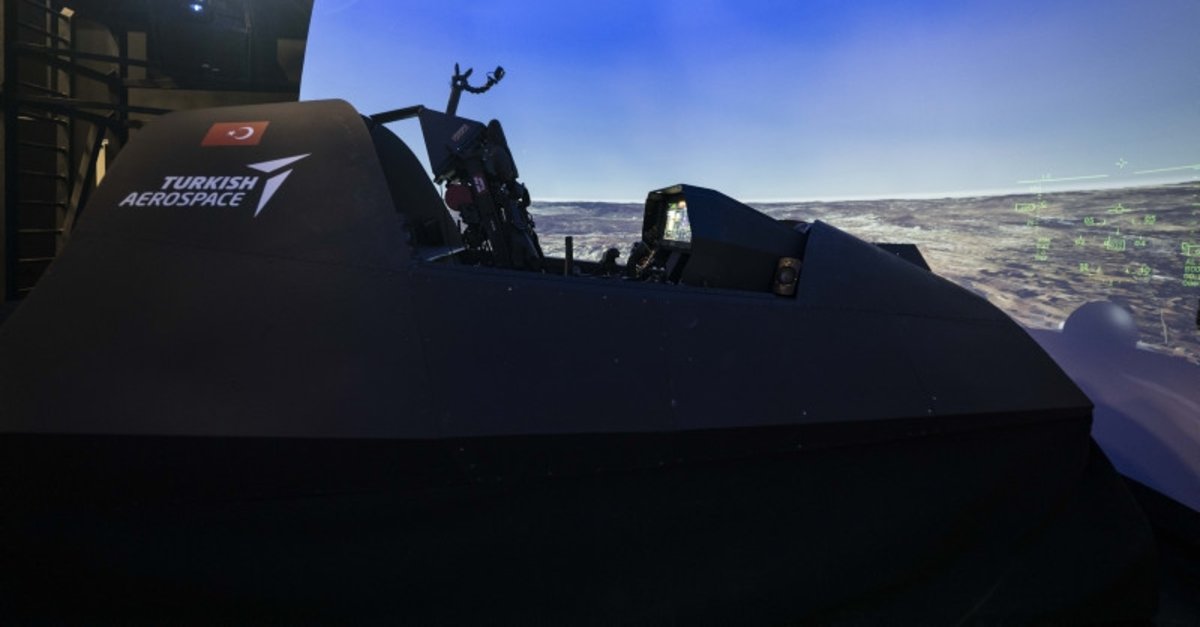Wed 14 June 2023:
The Turkish-made combat aircraft KAAN, developed by Turkish Aerospace Industries (TUSAŞ), is nearing its first flight, thanks to the intensive work of Turkish engineers and pilots in the engineering development simulator.
The simulator, built with domestic facilities, allows for the development of KAAN according to the project schedule and cost-effectively.

Gökhan Bayramoğlu, the test pilot of KAAN, emphasized the importance of the engineering development simulator in the development process.
The simulator reflects the design of the aircraft and any changes made to it, which are then verified through flights conducted by the pilots.
The simulator serves as a vital tool in strengthening the systems required for the first flight, such as flight controls, landing gear, and ground guidance systems, as well as identifying and resolving potential issues.
Bayramoğlu highlighted the collaborative role of test pilots and engineers in the simulator.

They work together to ensure the accuracy and effectiveness of the designed data in the simulator and transfer that knowledge to the pilots for the first flight and future prototypes.
The simulator allows them to determine pilot procedures, reduce workload, and incorporate emergency procedures into the aircraft’s user manual.
"We will be one of the five countries in the world producing this type of fifth-generation fighter jet."
Türkiye unveils its new national combat aircraft, KAAN, which is set to replace the Turkish army's ageing F-16 fleet pic.twitter.com/gb7YEC1fMl
— TRT World (@trtworld) May 2, 2023
The simulator aims to provide a one-to-one experience with the actual aircraft, allowing engineers and pilots to verify and refine their work in a controlled environment.
The simulator is considered crucial for its ability to support engineering and piloting abilities, helping to identify any deviations between the simulated and actual flight. It allows for continuous improvement and helps familiarize pilots with the aircraft’s powerful engines.

Bayramoğlu emphasized that KAAN is designed to be a powerful combat weapon, not just an aircraft, with capabilities in air-air, air-ground, and electronic operations.
The simulators will continue to play a role in the project, evolving from development and engineering simulators to training simulators. The goal is to train Air Force pilots and prepare them to train new pilots using the simulators.
Gökhan Şimşek, the TUSAŞ Simulator and Training Systems Integrated Product Manager, discussed the importance of engineering development simulators for large projects like the national combat aircraft.
They allow for timely and cost-effective development, providing a return on investment in terms of time and resources. The simulator infrastructure has been designed since 2016 and undergoes continuous improvement as the project progresses.

The simulator serves multiple functions, including flight testing, analysis of mission-oriented performances, and cockpit-specific evaluations. It integrates design changes and provides feedback to the development teams.
The engineering development simulator for KAAN is unique in its integrated structure and operational element simulations.
Şimşek emphasized that the engineering development simulator will continue to evolve with the aircraft, accommodating future versions and updates.
As the aircraft develops and feedback is received from the field, the simulator will re-evaluate the design and integrate new features, sensors, and weapons.

The simulator infrastructure is expected to endure as long as the aircraft itself, supporting its ongoing development.
The national combat aircraft project is considered significant for Türkiye, and the team working on the engineering infrastructures hopes to contribute to the country’s technological advancement.
They consider it crucial to properly inform future generations about the achievements of the national combat aircraft and its impact on the country’s defense capabilities.
Agencies and A News
______________________________________________________________
FOLLOW INDEPENDENT PRESS:
TWITTER (CLICK HERE)
https://twitter.com/IpIndependent
FACEBOOK (CLICK HERE)
https://web.facebook.com/ipindependent
Think your friends would be interested? Share this story!





